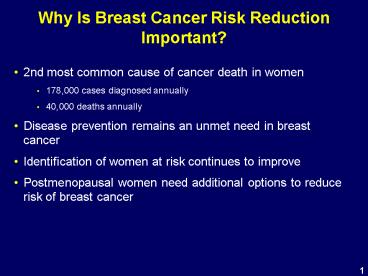Why Is Breast Cancer Risk Reduction Important - PowerPoint PPT Presentation
1 / 7
Title:
Why Is Breast Cancer Risk Reduction Important
Description:
Disease prevention remains an unmet need in breast cancer ... Breast Cancer (1982-1998) ... amended to add invasive breast cancer as a second primary endpoint ... – PowerPoint PPT presentation
Number of Views:61
Avg rating:3.0/5.0
Title: Why Is Breast Cancer Risk Reduction Important
1
Why Is Breast Cancer Risk Reduction Important?
- 2nd most common cause of cancer death in women
- 178,000 cases diagnosed annually
- 40,000 deaths annually
- Disease prevention remains an unmet need in
breast cancer - Identification of women at risk continues to
improve - Postmenopausal women need additional options to
reduce risk of breast cancer
2
Raloxifene is aSelective Estrogen Receptor
Modulator
- Non-steroidal ligand of the estrogen receptor
- Has estrogen-like effects in some tissues
- Blocks estrogen effects in other tissues
Evista (raloxifene HCl 60 mg/day) is approved
for the prevention and treatment of osteoporosis
3
Raloxifene Development HistoryBreast Cancer
(1982-1998)
- 1982-1990 IND for treatment of Breast Cancer
opened with the Oncology Division - IND for osteoporosis opened with Endocrine
Division - MORE study initiated (breast cancer secondary
endpoint) - IND for invasive breast cancer risk reduction
opened - IND for STAR opened by NSABP
- RUTH study initiated (CV risk reduction)
4
Raloxifene Development HistoryBreast Cancer
(1999 present)
- CORE study initiated (follow-up to MORE
invasive breast cancer primary endpoint) - RUTH protocol amended to add invasive breast
cancer as a second primary endpoint - 2005 Pre-NDA meetings with the Oncology Division
- 2006 Invasive breast cancer risk reduction NDA
submitted
5
Evista Current Indication
The prevention and treatment of osteoporosis.
- Proposed Additional Indication
The reduction in risk of invasive breast cancer
in postmenopausal women with osteoporosis.
6
Evista Current Indication
The prevention and treatment of osteoporosis.
- Proposed Additional Indication
The reduction in risk of invasive breast cancer
in postmenopausal women at high risk for breast
cancer.
7
Studied in More Than 37,000 PostmenopausalWomen
Across a Spectrum of Breast Cancer Risk
- Randomized active comparator trial
- Study of Tamoxifen and Raloxifene (STAR)
- Randomized placebo-controlled trials
- Raloxifene Use for The Heart Trial (RUTH)
- Multiple Outcomes of Raloxifene Evaluation (MORE)
- Placebo-controlled follow-up study of MORE
participants - Continuing Outcomes Relevant to Evista (CORE)
76,000 patient years of exposure to raloxifene































